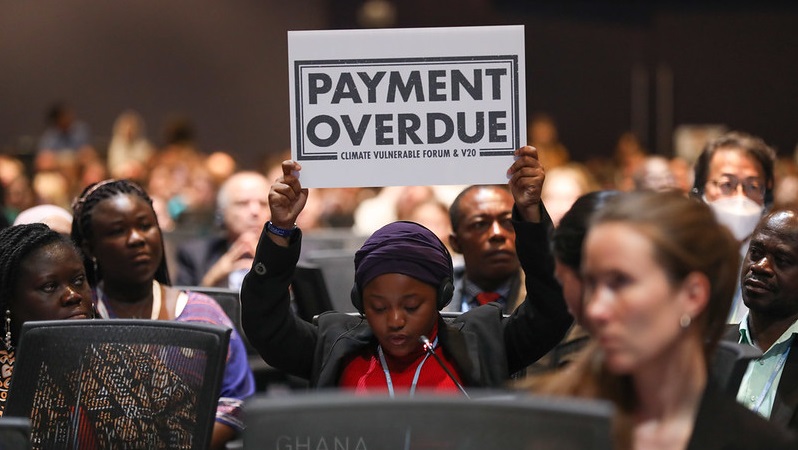Simon Stiell says much more money is needed for developing countries to come up with bold new climate plans, which would benefit all economies
The head of the United Nations climate body, Simon Stiell, said on Wednesday that a “quantum leap” in climate finance is needed so that many countries can present strong new climate action plans next year.
“It is difficult for any government to invest in renewable energy or climate resilience when the treasury coffers are empty, debt service costs have exceeded health spending, new borrowing is impossible and the wolves of poverty are at the door” he said in a major speech at the Chatham House think tank in London.
Climate finance has traditionally consisted mainly of wealthy governments and multilateral development banks providing loans and grants to developing countries to help them reduce planet-warming emissions and adapt to climate change.
But Stiell’s speech focused largely on other sources of funding, which would not burden taxpayers in rich countries but are unlikely to be agreed in time for next year’s round of climate plans under of the Paris Agreement.
Stiell said governments must agree at this year’s Cop29 UN climate summit “on a new target for climate finance that meets the needs of developing countries.” But, he added, “it’s not enough to agree on a goal. “We need a new agreement on climate finance between developed and developing countries.”
Billionaires and ships
That would include “new sources of international climate finance, as the G20, the International Maritime Organization (IMO) and others are working on,” he noted.
The Brazilian government, as president of the G20, wants The group’s top 20 economies agreed to a minimum tax on billionaires, and it has been hinted that some of this tax could be spent on climate finance.
spring meetings can drive financial reform for food and climate
But this has not been agreed and is likely to prove controversial. E3G analyst Sima Kammourieh said geopolitical divisions over the wars in Ukraine and Gaza had slowed the G20 negotiations, as had the recent death of the Brazilian diplomat leading the discussions, Daniel Machado da Fonseca.
Meanwhile, IMO governments have agreed to put a price on shipping emissions. But IMO maritime negotiators and governments have suggested they want most of this money to be used to clean up the shipping industry, not for broader climate finance, such as the new UN loss and damage fund.
spring meetings
Ahead of next week’s spring meetings of the World Bank and the International Monetary Fund (IMF), Stiell reiterated his support for the Bridgetown Agenda, a set of international financial reforms that would direct more multilateral financing toward the fight against climate change. .
“The Spring Meetings are not a dress rehearsal. Avoiding a climate-induced economic catastrophe is our primary task,” Stiell said. “It cannot go unnoticed between different mandates.”
So far, the biggest reform agreed upon is a change to the World Bank’s debt-to-equity ratio of 1%. That will free up $4 billion a year, but while reformers call for more, opponents fear that credit rating agencies will downgrade the bank, making borrowing more expensive.
european court The climate inaction of States violates human rights.
The most recent proposal in Stiell’s speech was his call for the IMF to make “more use” of an obscure fund of money called the Catastrophe Containment Relief Fund (CCRT).
The CCRT provides debt relief grants to the world’s poorest countries when they are affected by disasters that reach a pre-established threshold of destruction.
But the latest IMF report annual report described the trust as “critically underfunded” with “insufficient resources to provide meaningful relief” when another disaster strikes.
Old-fashioned finances?
French President Emmanuel Macron has been a strong supporter of a new global finance pact that would pump more money into climate action in indebted developing countries, and he hosted many world leaders at a summit in Paris last year to discuss the reforms.
But last month, france court its aid budget by 12.5%. The United Kingdom has also reduced its aid spending in recent years and changed the figures to make them count more as climate financing, while a possible victory for Donald Trump threatens the already relatively low level of international climate financing from the United States.
Former French diplomat Laurence Tubiana, who now chairs the European Climate Foundation, told reporters yesterday that in Europe “fiscal space is simply non-existent,” adding that “the agenda of the day is to cut public spending.”
But Sara Jane Ahmed, a financial adviser to the V20 group of climate vulnerable countries, told Climate Home that rich nations can create more fiscal space by printing money, borrowing, taxing or cutting spending elsewhere.
In London, Stiell said a “quantum leap in climate finance is essential and entirely achievable” and argued that providing more is in the interests of powerful developed countries.
Without climate finance, he said, poorer nations would not come forward with bold new climate plans and then “all economies, including the G7, will soon be in serious and permanent conflict.”
